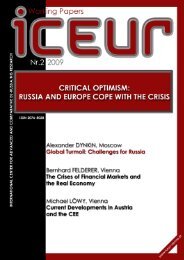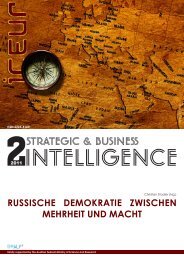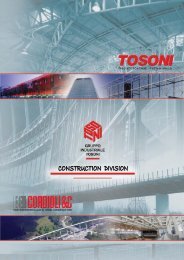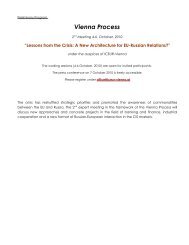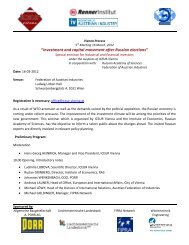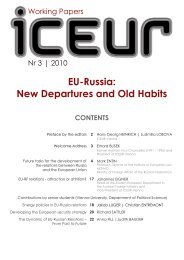International Center for Advanced and Comparative EU-Russia
International Center for Advanced and Comparative EU-Russia
International Center for Advanced and Comparative EU-Russia
Create successful ePaper yourself
Turn your PDF publications into a flip-book with our unique Google optimized e-Paper software.
The overarching interests of the post-Soviet elites have undergone considerable change during the last twodecades. Despite deep political <strong>and</strong> ideological cleavages, the <strong>Russia</strong>n elites by <strong>and</strong> large took a consolidated <strong>and</strong>uni<strong>for</strong>m position during the 90s. The aspiration was dominant “To actively use any chance to break with theSoviet past irrevocably <strong>and</strong> <strong>for</strong> good”1. For the post-Soviet elites, privitization <strong>and</strong> the creation of a new class ofowners as well as their political <strong>and</strong> economic integration ranked high on the agenda.The Western orientation of <strong>Russia</strong>n politics was dictated by the apprehensions that market re<strong>for</strong>m could triggerthe opposition of broad layers of the population, who were used to Soviet paternalistic patterns. On top of that,the dire situation of the economy <strong>and</strong> the country's dependence on international financial support played a role.The leading elites regarded the Western countries as the main guarantors <strong>for</strong> a successful break with the sovietpast, since they were facing domestic instability <strong>and</strong> the deficient legitimacy of the new post-Communistgovernment, which was further weakened by the economic re<strong>for</strong>ms of 1992.The economic interests of the new leading elites emerged during the 1990s. They had to <strong>for</strong>ce the export ofvarious raw materials such as oil, gas, metals <strong>and</strong> wood to the West, in order to obtain the necessary financialmeans <strong>for</strong> the upcoming privatization. The only competitive manufacturing industries were those of chemistry<strong>and</strong> defense, whose volume was contracting rapidly. All this led to the genesis of a strongly export-orientedeconomy, which shouldered the role of a raw material provider <strong>for</strong> the leading industrial countries. The interest ofthe new leading elites to export resources to the world market became fundamental, long-term <strong>and</strong> general in thecontext of the fact that the income from the export of natural resources <strong>for</strong>med the basis of the budget.Incidentally, the share of income derived from the export of carbon hydrates continued to rise during the firstdecade of the new millennium. The control of these resources by the new post-Soviet elites was seen as a vehicle<strong>for</strong> rapid integration with the global ones. At the same time, they expected that this process would be contingenton their special <strong>Russia</strong>n conditions set by themselves.The marginality of geopolitical interests during the 90s had several causes. For one thing, <strong>Russia</strong> was not in aposition to pursue proactive <strong>for</strong>eign policies due to its scarce resources. It was there<strong>for</strong>e <strong>for</strong>ced to ab<strong>and</strong>on itspresence in many regions of the world. This was true of Africa, South <strong>and</strong> East Asia, the Near East <strong>and</strong> LatinAmerica. Secondly, the drive to break with the Soviet past through a rapprochement towards the West alsoimplied renouncing the geopolitical ambitions of the Soviet Union, whose legal successor <strong>Russia</strong> had become.The country was focused on survival <strong>and</strong> had not yet developed new geopolitical priorities. This happened onlyin the second half of the 90s, after society had turned away from the disappointing re<strong>for</strong>ms <strong>and</strong> the leading eliteshad ab<strong>and</strong>oned their hopes <strong>for</strong> a rapid Western integration. By <strong>and</strong> large, the discourse over geopolitical interestsduring the 90s was monopolized by the opposition <strong>and</strong> the counter-elites, who came out against market <strong>and</strong>democratic re<strong>for</strong>ms.What were the changes in the new millennium? In the first line, the elites obtained full control over the assets ofthe <strong>Russia</strong>n economy. The presidential elections of 1996 finished off speculation about a return of Communistrule. At the beginning of the new millennium, it had become abundantly clear that there was no danger of aCommunist restoration. This helped the new post-Soviet elites to establish <strong>and</strong> strengthen their monopoly ofpolitical power. They emerged as masters of the country in the full sense of the word. The increase of gas <strong>and</strong> oilprices permitted them to advance their positions toward the West more energetically. <strong>Russia</strong>'s role in thisdialogue changed; <strong>Russia</strong> no longer was the petitioner, but insisted more <strong>and</strong> more on the role of an equal partneras the dem<strong>and</strong> <strong>for</strong> carbon hydrates continued to rise.At the same time, the model of post-Soviet capitalism which emerged in the 90s showed that the ruling eliteswere not interested in rooting the Western liberal market order in <strong>Russia</strong>. The <strong>Russia</strong>n model is based on themerger of political power <strong>and</strong> ownership in the h<strong>and</strong>s of small elite circles <strong>and</strong> on its neo-feudal character whichis a type of patrimonialism. The disappointed <strong>Russia</strong>n elites distanced themselves from the West, since they hadthe feeling of having been excluded from the club they had tried to join2.Consequently, the necessity of Western support <strong>for</strong> the re<strong>for</strong>ms <strong>and</strong> the model function of the West was no longergiven. The shortcomings of the re<strong>for</strong>m stoked the anti-Western <strong>and</strong> anti-liberal mood of the masses <strong>and</strong> this wasused by the elites as an additional collateral to enhance their domestic power. The idea of the “<strong>Russia</strong>n Way”,which was immune from the impact of globalization, served as a vehicle to increase legitimacy. In this context,the <strong>Russia</strong>n elites posed as the only protectors <strong>and</strong> spokesmen of the country in the international arena.1 Solov´ev, E.G., National Interests <strong>and</strong> Political Forces in Contemporary <strong>Russia</strong>, Moscow: Nauka, 2004, 130.2 Apparently the last attempt at Western integration was undertaken in 2001-2003, when Moscow stood fully behind the anti-terroroperation of the US <strong>and</strong> its allies in Afghanistan <strong>and</strong> closed its bases in Vietnam <strong>and</strong> Cuba. Nevertheless, the US considered these steps asthe fulfillment of an obligation <strong>and</strong> was not ready to honor it with a quid pro quo.– 4 –




